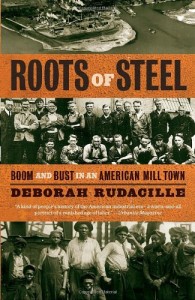
Author: Deborah Rudacille
Publisher: Anchor, 2011
As the American economy seeks to restructure itself, Roots of Steel is a powerful, candid, and eye-opening reminder of the people who have been left behind.
When Deborah Rudacille was a child in the working-class town of Dundalk, Maryland, a worker at the local Sparrows Point steel mill made more than enough to comfortably support a family. But the decline of American manufacturing in the decades since has put tens of thousands out of work and left the people of Dundalk pondering the broken promise of the American dream. In Roots of Steel, Rudacille combines personal narrative, interviews with workers, and extensive research to capture the character and history of this once-prosperous community.
Reviews“[An] affecting portrait of a decaying loop on the Rust Belt . . . Rudacille has delivered a book that would do Studs Terkel proud, partaking of his oral-historical approach to the past at turns, imbued with his pro-labor spirit throughout. Required reading for activists and for those wondering where things went wrong for America’s working people” (Kirkus Reviews)
“Capturing workers’ experiences with a company emblematic of American steel’s decline, Rudacille’s work is a poignant contribution to American labor history” (Gilbert Taylor, Booklist)
“With a rare combination of personal empathy and clear-eyed reportage, Deborah Rudacille has gone to the heart of Dundalk, Maryland and emerged with a careful, cohesive case-study of the American dream abandoned . . . Roots of Steel is nothing less than a chronicle of a great society unmoored” (David Simon, creator of The Wire)
“Deborah Rudacille’s latest book is a well-informed, engagingly written elegy to Baltimore steel as it’s gone to rust—by an excellent writer with every reason to take this story personally” (Madison Smartt Bell, author of Devil’s Dream and All Souls’ Rising)
“Drawing on her family members, old neighbors, acquaintances, and a trove of archived oral histories, Rudacille . . . crafts a narrative people’s history at its finest. The stories are so personal and intense that you can almost feel the furnace flames” (Beatbox)